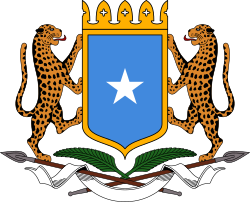Organizations
Minister of Internal Security Role: Head of the ministry, responsible for overall leadership, policy formulation, and strategic direction.
Deputy Minister of Internal Security Role: Assists the Minister and oversees specific portfolios or departments within the ministry.
Permanent Secretary Role: Senior civil servant in the ministry, responsible for administrative and operational management.
Directorates These are specialized departments within the ministry, each focusing on specific areas of internal security:
Directorate of Police Role: Oversees the Somali Police Force, ensuring law enforcement and public order. Components: Includes various divisions such as Criminal Investigations, Traffic Police, Community Policing, etc.
Directorate of Immigration and Border Control Role: Manages immigration, visas, and border security. Components: Includes Immigration Services, Border Patrol, and Passport Services.
Directorate of National Intelligence and Security Agency (NISA) Role: Handles intelligence gathering and national security operations. Components: Includes Intelligence Analysis,
Directorate of Fire and Emergency Services Role: Manages fire prevention, firefighting, and emergency response services. Components: Includes Fire Departments, Emergency Medical Services, Disaster Response Units.
Support Services These departments provide essential administrative and logistical support to the ministry:
Human Resources and Administration Role: Manages staffing, recruitment, training, and administrative services. Components: Includes Personnel Management, Training and Development, Administrative Services.
Finance and Procurement Role: Oversees budgeting, financial management, and procurement processes. Components: Includes Budget Office, Accounting, Procurement Services.
Legal Affairs Role: Provides legal advice and ensures compliance with national and international laws. Components: Includes Legal Advisors, Compliance Officers, Policy Analysts.
Information Technology Role: Manages IT infrastructure, cybersecurity, and information systems. Components: Includes IT Support, Cybersecurity Units, Data Management.
Regional and District Offices Role: Extend the reach of the ministry to local levels, ensuring implementation of policies and coordination with regional and district security forces. Components: Regional Command Centers, District Security Offices, Local Police Stations.
Advisory Councils and Committees Role: Provide strategic advice and recommendations on various aspects of internal security. Components: Includes Security Advisory Council, Committee, Community Safety Committees.
Special Units and Task Forces Role: Address specific security challenges and threats. Components: Includes Anti-Narcotics Units, Rapid Response Teams.
Integration of the Ministry of Internal Security (Somalia) within ATMIS Roles and Collaboration Points **
Coordination and Collaboration: Operational Coordination: The MoIS works closely with ATMIS to plan and execute joint security operations aimed at combating Al-Shabaab and other insurgent groups. Strategic Alignment: The MoIS ensures that ATMIS activities align with national security policies and priorities.
Intelligence Sharing: Intelligence Coordination: The MoIS shares critical intelligence and information with ATMIS to enhance the effectiveness of security operations and counter-terrorism efforts. Joint Analysis: The MoIS participates in joint intelligence analysis and threat assessments to inform operational planning.
Law Enforcement Support: Policing Operations: The MoIS supports ATMIS in maintaining law and order in liberated areas by providing police forces and engaging in joint law enforcement operations. Community Policing: The MoIS works with ATMIS to implement community policing initiatives that build trust between security forces and local communities.
Stabilization and Governance: Stabilization Efforts: The MoIS partners with ATMIS to stabilize areas recovered from insurgent control, ensuring the restoration of government authority and public services. Governance Support: The MoIS assists in the establishment of local governance structures and the rule of law in collaboration with ATMIS.
Human Rights and Protection: Human Rights Monitoring: The MoIS collaborates with ATMIS to monitor and report on human rights issues, ensuring compliance with international standards. Civilian Protection: The MoIS works with ATMIS to protect civilians in conflict-affected areas and support humanitarian efforts.
Crisis Response and Emergency Management: Emergency Response: The MoIS coordinates with ATMIS in responding to security crises and emergencies, including terrorist attacks and natural disasters. Disaster Management: The MoIS engages in joint efforts with ATMIS to provide emergency services and humanitarian assistance to affected populations.
Public Communication and Outreach: Public Awareness: The MoIS partners with ATMIS to conduct public awareness campaigns on security issues and the role of security forces.
Community Engagement: The MoIS engages local communities in dialogue and outreach activities to build support for security initiatives and counter-extremism efforts. By fulfilling these roles, the Ministry of Internal Security (Somalia) ensures effective collaboration with ATMIS, contributing to the overall mission of achieving peace, stability, and security in Somalia. [5]

